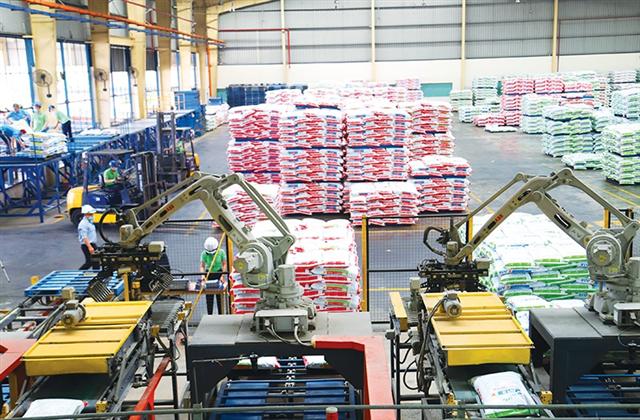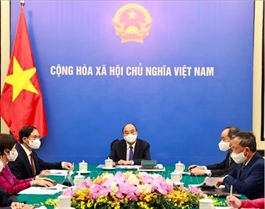Wide-ranging support ahead for economy
Wide-ranging support ahead for economy
To spur on local production and achieve its desired economic growth goal, Vietnam is to enact new financial solutions aimed to assist the business community. However, will the schemes affect the state budget picture, which earned a surplus in the first quarter of this year?

Wide-ranging support ahead for economy, illustration photo
|
It is expected that providing more support for struggling enterprises in Vietnam will be discussed at the 15th National Assembly’s (NA) first session to be held on July 20, with new NA deputies to be elected this month.
The legislature will debate results of reports on implementing socioeconomic development plans in the year’s first half and solutions on implementing such plans for the remainder of 2021. The NA is also expected to consider new support solutions for enterprises hurt by the global health crisis, while also reviewing the implementation of similar packages in the past year.
In February, the Ministry of Planning and Investment issued a draft document on more solutions to assist enterprises. The document will be approved by the government. Inputs for it are being proposed by ministries and agencies.
Over the past 12 months, never has in Vietnam a government-initiated pro-business policy been complained about as much as by not only enterprises and experts, but also by many NA deputies like the VND62 trillion ($2.7 billion) package to support 20 million poor and unemployed people. The package, which is facing difficulties in disbursement, includes a VND16 trillion ($695.65 million) sum aimed to provide loans for enterprises at a zero per cent lending rate to pay salary for employees. The reason behind slow disbursement is that though the VND62 trillion package was announced in April 2020, meagre results have been made so far because of too many hurdles.
“Amid massive difficulties, slow-paced implementation of government-led policies like this package to assist enterprises hit by COVID-19 is leaving many businesses in the lurch, making it hard to boost economic growth,” said NA deputy Luu Binh Nhuong, representing the Mekong Delta province of Ben Tre.
“Though the government has been making great efforts to boost administrative reforms via reducing and removing tens of thousands of administrative procedures and developing an e-government, the public and businesses are still lamenting over difficulties they’re facing in their business and production. Enterprises are in critical need of state support.”
Fresh assistance
On April 19, the government signed and issued Decree No.52/2021/ND-CP on extension of time limits for payment of VAT, enterprise income tax, personal income tax, and land rental in 2021. This decree took effect on the signing date.
“The total size of the package was estimated at VND115 trillion ($5 billion). If implemented well, it is expected to help businesses and households maintain their economic activities, particularly in tourism, which remains depressed,” the World Bank said in its March bulletin on Vietnam’s economy.
Specifically, Decree 52 extends the time limits for payment of the payable VAT amount of the tax periods of March-August 2021 (if making monthly VAT declaration), and the tax periods of first and second quarters of 2021 (in case of making quarterly VAT declaration) of enterprises and organisations.
The extension duration is five months for the VAT amount of the tax periods of March-June 2021, and the tax periods of first and second quarters of 2021; four months for the VAT amount of the tax period of July 2021; and three months for the VAT amount of the tax period of August 2021. Enterprises and organisations eligible for extension of tax payment time limits shall make and submit monthly or quarterly VAT declarations but are not required to pay the payable VAT amounts stated in the VAT declarations already filled in.
Besides this, the time limit for payment of the payable land rental amounts of the first period of 2021 of enterprises, organisations, business households, and individuals that fall into the cases as prescribed and are leased land directly by the state under decisions of or contracts signed with competent state agencies in the form of annual payment of land rental also is extended for further six months, from May 31.
The Ministry of Finance (MoF) said Decree 52 is necessary as it will help enterprises and individuals have more financial resources to maintain and recover production and business activities, contributing to helping the country achieve its economic growth of expected 6.5 per cent this year.
Since the second quarter of 2020, the government has also been deploying some drastic measures to support businesses. For instance, the State Bank of Vietnam has deployed a package worth VND180 trillion ($7.82 billion) for enterprises and households, in the form of debt payment deferral and preferential loans. However, no concrete reports on how this huge package has been carried out have been revealed.
Last September, the government also promulgated Decree No.109/2020/ND-CP providing the extension of time limits for excise tax payment for domestically manufactured or assembled cars. Decree 109 extended the time limits for payment of the payable excise tax amount incurred in the tax period of March-October 2020 for domestically manufactured or assembled automobiles.
Considering budget landscape
The MoF said that the tax payment extension and deferral under Decree 52 will not cause any reduction in state budget revenue because taxpayers will still have to implement their tax payment obligations at the year’s end.
According to the World Bank, Vietnamese authorities appear to have shifted to a more neutral fiscal policy as the economy has been recovering. The fiscal balance was in surplus for the first time since the onset of the pandemic. In the first quarter of 2021, the government collected VND403.7 trillion ($17.55 billion) of revenues - a 3.2 per cent on-year increase, while total spending decreased by 0.4 per cent on-year to VND341.9 trillion ($14.86 billion), resulting in a fiscal surplus of over VND60 trillion ($2.6 billion), which is 29 per cent higher than a year ago.
“High revenues reflected a stronger domestic sector and the solid growth of imports with taxes on international transactions increasing by 9.7 per cent on-year,” the World Bank said in its April bulletin.
According to the International Monetary Fund (IMF), Vietnam’s fiscal deficit is expected to reach 5.4 per cent of GDP in 2020, compared to 3.5 per cent envisaged in the budget. This is due to declining revenues and the operation of automatic stabilisers. Higher cash transfers and capital spending will boost spending.
The IMF said in 2021, the headline deficit is expected to narrow as priority expenditures remain in place to support the recovery, while revenues recover with improved economic activity, albeit only gradually owing to loss carry-forward provisions. The fiscal stance would thus be moderately contractionary – the cyclically-adjusted primary deficit is projected to decline by 0.4 percentage points of GDP – even though other spending, including health and public investment, would increase, both relative to the 2020 budget and 2019 outcomes.
Commenting on the potential new support solutions in the future for enterprises, Do Van Sinh, member of the NA’s Economic Committee, told VIR that any new economic stimulus package is “quite necessary given enterprises facing massive difficulties.” However, he said, in order for the package to be materialised, it is necessary to have a closer look at the state budget situation.
Vietnam suffered from a total budget deficit of VND274.3 trillion ($11.9 billion) in 2020 and VND273 trillion ($11.87 billion) in 2019.
“Thus if another economic stimulus package is enacted, how much will it be, especially given numerous difficulties in the state budget? I think it is necessary now to first effectively carry out the existing packages,” Sinh said.
|
Recommendations from the International Monetary Fund Given continued slack in the economy and available fiscal space, the fiscal stance should remain neutral or moderately expansionary in 2021, with improvement of government spending execution as priority. This would imply somewhat greater fiscal support than currently factored into staff’s baseline projection to facilitate the recovery. Fiscal policy could switch to a gradual consolidation once the recovery is complete and downside risks have eased. Health expenditure should be topped-up as needed: Future outbreaks could test the resilience of the country’s health infrastructure. In this respect, higher allocation for health expenditure envisaged in the 2021 budget is welcome, but further spending may be needed to secure resources for a vaccine rollout. Expand and improve the adequacy and efficiency of social protection: The coverage of existing social safety nets should be scaled up by relaxing burdensome eligibility criteria for existing programmes and extending the safety net (for example, to families with children and the elderly). It is suggested that doubling the replacement income rate of some existing programmes to around 60 per cent (the level under formal unemployment insurance) would cost an additional 0.1 per cent of GDP if introduced for a temporary 3-month period. Better identification of beneficiaries at the local government level should also help speed up disbursements. This is especially important given the sizable informal sector and a prerequisite for the success of future support if large-scale outbreaks occur. Recent relaxation of eligibility criteria slightly increased the uptake of concessional loans from the development bank, but there is scope to further increase loan duration and amounts. Re-consider tax deferrals and support businesses: Weak uptake and profitability, especially in the hardest-hit sectors, argues against an expansion or extension of tax deferrals. Instead, temporary corporate income tax (CIT) loss-carry backwards could be introduced to improve firms’ cash flows. Temporary provisions for accelerated depreciation or investment tax credits could lower the user cost of capital and encourage firm investment. Temporary CIT reductions could be better targeted to benefit distressed but viable small- and medium-sized enterprises in priority sectors, in place of the current approach that only uses 2020 income as the basis for eligibility. |



























